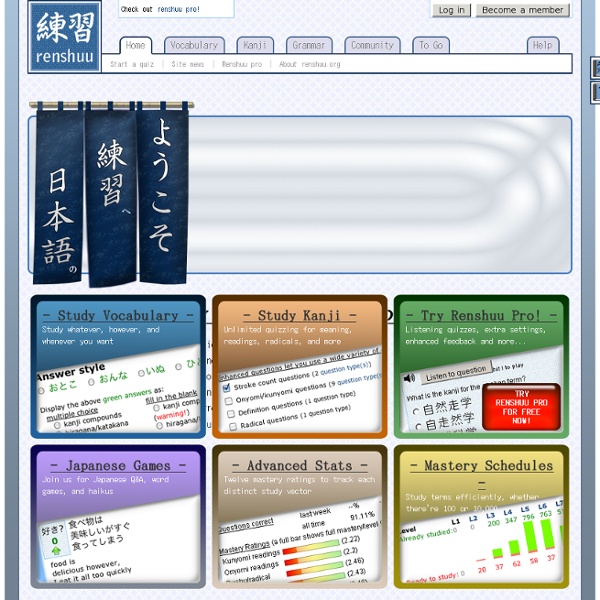



TextFugu Online Japanese Textbook Teaching reading IS rocket science - Louisa Moats Before you start reading, and before you start writing, you’re going to learn how to pronounce nearly all the “sounds” of the Japanese language. If you can’t pronounce anything, you won’t be able to read or write anything either. If you learn how to pronounce something while you’re learning to read and write it, you’ll run into overload. By learning pronunciation first (without knowing how to read or write anything) you’re essentially breaking the process up into smaller pieces and ultimately saving yourself a lot of time. In order to learn the pronunciation, though, we’re going to use hiragana. Backlash against Miyazaki is generational If you haven’t lived in Japan, it’s hard to appreciate just how beloved are anime maestro Hayao Miyazaki and his creative hub, Studio Ghibli. Annual surveys of Japanese consumers often find that Ghibli is their favorite domestic brand, ahead of stalwarts such as Toyota and Sony. Miyazaki’s animated epics regularly top the domestic theatrical market. “Kaze Tachinu” (“The Wind Rises”), his latest film — loosely based on the life of engineer Jiro Horikoshi, designer of Japan’s wartime Zero fighter plane — soared above its box office rivals for seven consecutive weeks after its July release. Meanwhile, his Oscar-winning “Spirited Away” (2001) remains the top-grossing film in Japanese history, knocking aside Hollywood live-action contenders such as “Titanic” and the “Harry Potter” films. But the rest of the world has been catching up.
Japanese counter word In Japanese, as in Chinese and Korean, numerals cannot quantify nouns by themselves (except, in certain cases, for the numbers from one to ten; see below). For example, to express the idea "two dogs" in Japanese one must say 二匹の犬 ni hiki no inu (literally "dog of small-animal-count-two"). Here 犬 inu means "dog", 二 ni is the number 2, "の" "no" is a possessive particle, and 匹 hiki is the counter for small animals.
Aedict3 Japanese Dictionary FunEasyLearn is the easy and fun new way to learn Japanese - whether you like listening music from other countries, travelling abroad, working for an international company, or chatting with foreign friends. Our app encourages your kids to learn speaking Japanese quickly. Get the FREE vocabulary app right now! Fun* Select from 7 fun games to learn in a uniquely entertaining manner.* Built-in "Spin Categories" feature allows the app to choose a random topic, subtopic and game for you to enhance your learning experience.* "Review Manager" allows you to review all the words you've learned during each game. Easy* No internet connection is required to use the app.* 3 difficulty levels: beginner, intermediate and advanced.* Choose your preferred tuition language from 51 pre-programmed interface languages: Japanese, English, German, French, Turkish, Russian, Korean, Arabic, Thai, Italian, Spanish, etc.
CAUSATIVE AND PASSIVE Posted by Tae Kim We will now learn the last two major types of verb conjugations: causative and passive forms. These two verb conjugations are traditionally covered together because of the notorious causative-passive combination. Find OpenCourseWare with OCW Search The EDICT Dictionary File Welcome to the Home Page of the EDICT file within the JMdict/EDICT Project. This page has been written by Jim Breen (hereafter "I" or "me") and is intended as an overview of the file, with links to more detail elsewhere. Background Way back in 1991 I began to experiment with handling Japanese text in computer files, and decided to try writing a dictionary search program in Turbo C under DOS, which used a simple dictionary file contained in the MOKE (Mark's Own Kanji Editor) package. To make this program more useful, I began to expand the file itself.
The Japanese Slang Jiko undefined The Japanese Slang Jisho 最 高君の俗語の辞書HOMEPAGE ABAYO >> Informal term for "good bye", this is not considered a polite way to say goodbye. ABUNE >> Slang, this is an exclamation take from "abunai". It is used as in, "That was close!!!"
Japan Info Swap » Free eBooks on Living in Japan Living in Japan may be a temporary stop on your career journey, a permanent home, or something in between. No matter how you got here or how long you plan to stay, living in Japan is a strange and exciting experience for most expats. Japan offers many wonderful opportunities, but also new obstacles and issues you may not expect. Living in Japan may not be all picnics and roses, but the troublesome and mundane parts of the experience will no doubt offer you the greatest opportunities to learn and grow. Whatever your background or Japanese experience has been or will be, we believe our collection of free eBooks and destination guides will add value to your time here and provide provocative insights to life as an expat in Japan. These guides and the “H&R Group Newsletter” are sponsored by the H&R Group.
Coolest Traveling » The Best Japanese Slang Dictionary Online elcome to the premier dictionary of Japanese slang and colloquialism! Below you will find an update-to-date collection of colloquial expression, dialects, borrowed phrases, and pure, modern slang. Enjoy! P.S. Errors including typos and definitions are also welcome! Japanese Slang Dictionary Updates: -8/6/08: Added Japanese Characters and useful links.-11/18/08: Added a few more words and cleaned up some as well.
EIJIRO online dictionary 英語・語学の学習情報サイト「スペースアルク」:アルク AJATT: All Japanese All The Time